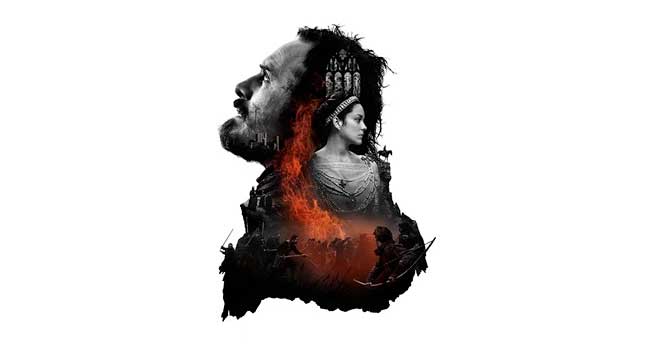
Visually, it’s a stunning film with exceptional shot choice and a clever style that’s crisp, but slightly surreal, tapping into the mysticism of Shakespeare’s Scottish tragedy. At its best, this is mesmerising, combing light and shade with the haze of fog and smoke to create a unique look and feel that is incredible throughout.
This is added to by the vivid colour that punctuates the dark tragedy, with orange light and painted faces cutting through the mist of battlefields in the opening scenes. The opulence and power of royalty is a big part of this too, acting as the palpable reasoning for the scheming regicide and murderous intent that overtakes Macbeth and his lady.
The only place where the visual intensity of the film falls down is towards the end where the momentous impact of the final battle scene is somewhat lacking. Whether it was constrained by budget or a conscious decision to strip it back to the bare minimum, it just feels a bit too underwhelming to convey the sheer scale of the turmoil that accompanies Macbeth’s very personal odyssey of greed and destruction. Instead of making the film tight and fine tuned, paring things down to just focus on Macbeth and Macduff in the closing battle results in the opposite effect for us, whereby the lack of a significant battle scene draws the lens away from its two by reducing its far reaching impact.
Performances from the impressive cast are high on quality, but low on the kind of projection we’re used to from Shakespeare adaptations. Instead of the gritty text rumbling thunderously in the film, it’s delivered under breath, on a whisper and sometimes in tongues, which makes it much more difficult to follow than your average Stratford-Upon-Avon production. Again, this is either a foible or an intentional attempt on the part of Kurzel to quiet things down to create gravitas, but it just makes it harder to follow and lacking in the ground shaking import that Shakespeare’s Macbeth ordinarily has.
The biggest issue for us though is that Lady Macbeth’s key scenes are underplayed in the extreme, so they end up lacking in importance when they should be the turning points on which the story shifts. Her “Out, damned spot!” scene is hunched and resigned, where it should be unhinged and desperate, and her suicide is a bit of an oddity.
This isn’t necessarily Marion Cotillard’s (Assassin’s Creed) fault as such, we’re sure she will have played the role as it was intended by the director, but they’re not as praise worthy as a result. That’s not to say that she’s doesn’t bring the role to life with a fierce performance in the gender challenging role, but as her biggest scenes lack the scything toll that they deserve, she doesn’t get the opportunity to reverberate as well as she could have done.
Michael Fassbender (X-Men: Apocalypse) is also incredibly good as Macbeth, looking every bit the ferocious Scottish thane who’s greed is piqued by the flattering grandeur depicted to him by the seers of the glen. If it wasn’t for the issues with volume control and budget deficits, his part in the film could have made him a contender for best actor nods across the board.
The rest of the cast is impressive, but again slightly undersold. Paddy Consadine (Child 44) is brilliant as the surprise entrant as Banquo, but his ghost scene isn’t given the cinematic effects that could have elevated it to be notice worthy, but instead it slips by as though unimportant. Sean Harris (Mission: Impossible – Rogue Nation) makes for a very severe Macduff, but with the quiet nature of the film and limited construct of the closing battle, his part can’t quite strike the note it may have done. David Thewlis (Legend) is a good choice for King Duncan, but Elizabeth Debicki (The Man From U.N.C.L.E. (2015)) is completely wasted in a scant portrayal of Lady Macduff.
In the end, Justin Kurzel has crafted a good adaptation in Macbeth (2015), but fails to really lift it to the levels of excellence we’d hoped for. It’s worth watching, especially now that it’s available on DVD, Blu-ray and digital download, but you’ll need absolute silence and focus to make it all out, even if you’ve got a pretty good knowledge of the play.
Macbeth (2015) DVD review: 3.6/5


